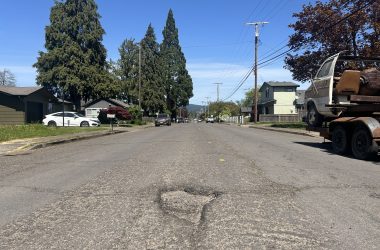SPRINGFIELD — More details have surfaced regarding the ethics investigation of a Lane County Commissioner and Springfield developer, David Loveall, as a public records request was received after the print deadline last week.

The Springfield Economic Devlopment Agency (SEDA) board unanimously voted for the Oregon Government Ethics Commission (OGEC) to initiate the investigation last month.
In a letter obtained by a public records request, the city attorney, Mary Bridget Smith, sent a letter to OGEC requesting that an investigation be opened to determine whether Loveall “violated Oregon Public Ethics laws regarding a funding request SEDA received from Masaka Properties, LLC.”
Loveall is the founder and managing partner of Masaka and confirmed that this case is regarding whether he told his Masaka business partner, Robert Miller, information from an executive session. The letter outlines specifics surrounding the investigation, including:
On Nov. 14, 2022, SEDA approved a $10 million loan to Blue McKenzie, LLC for a housing development project in the Downtown Renewal Plan area, which would be a mixed-use, eight-story building in Downtown Springfield behind the Buick Building.
On May 4, Assistant City Attorney Kristina Kraaz sent a confidential memo to the SEDA board to explain that the May 8 executive session meeting would be canceled. That memo discussed Blue McKenzie’s issues funding its project, which totaled to about $34 million, and stated that SEDA has contracted two financial experts to provide advice on this matter. The financial advice would be ready for the SEDA board to discuss at its rescheduled executive session meeting.
At the May 9 SEDA budget committee meeting, Loveall asked if the money approved for Blue McKenzie could be used on other projects if Blue McKenzie’s project was delayed. Staff did not rule out that possibility. On June 5, SEDA met in executive session to discuss the financing for the Blue McKenzie project. SEDA scheduled further discussion on this topic for another executive session on June 12.
However, on June 9, Miller sent SEDA staff a funding request on behalf of Masaka for a project also in the Downtown Urban Renewal Plan area, asking for $1.5 million to help fund its “most ambitious project to date.” Miller mentioned Blue McKenzie’s project and alluded to information that was not public knowledge yet.
“Now that the eight-story project seems to be stalled for some time, we feel that our project would be a desirable candidate for the economic needle to be significantly moved in housing and restaurant/retail needs, in a shorter time frame, with a much lower monetary need,” Miller wrote.
At the June 12 executive session, the SEDA board discussed Blue McKenzie’s challenges and options for next steps. Again, Loveall asked about funding other projects, but Smith interjected before staff could respond, stating that his question was not within that executive session’s focus.
On June 23, Miller delivered a packet of information about Masaka’s project and left a voicemail for staff, asking about the status of his request. Finally, on June 26, SEDA announced in regular session that the Blue McKenzie project was infeasible, terminating SEDA’s approval for the $10 million construction loan.
“Based on the timing and substance of this request, SEDA is asking OGEC to determine whether Loveall used confidential information he learned in the June 5, 2023, executive session for his own benefit when his business partner made the funding request shortly after that executive session,” Smith’s letter wrote.
Regardless of the timeline showing Miller knew information prior to SEDA releasing it publicly, Loveall said he did not share any information from an executive session and that Miller found out the information independently.
“Masaka Properties has established a seven-year road of trust with the city that, even given this position, they would know the character of who we are,” Loveall said. “We’ve never been anything but forthright.”
Loveall’s case is still in preliminary review. The preliminary review phase will end when OGEC staff, Loveall, and Loveall’s attorney meet in an executive session – which is a closed meeting – to review the staff report that OGEC creates during preliminary review. The executive session will result in one of two outcomes: the matter will be dismissed if OGEC does not find cause to investigate, or an investigation will be conducted if cause is found.







